Andrew and Trish Forsyth's Trip Report
Trip Report Year:
Download original PDF from here >>
December 2011
Sri Lanka is a tropical island of 430km long and 230 km wide at its widest, situated just north of the Equator. Most coastal and northern areas are low lying, with the centre of the island being very mountainous.
The ‘wet zone’ of the south-west and hills area has monsoon season in May-September, while the eastern and northern ‘dry zone’ has rain from November to February.
With over 400 bird species and 33 endemics, plus large numbers of mammals and reptiles, it is a fabulous, bio-diverse, small and easy destination for wildlife viewing.
After picking up a brochure at the British Birdfair from a small company called ‘Walk with Jith’, and hearing some great stories about birding in Sri Lanka, we took on an 11 day ‘Birding and Wildlife Budget Tour’. www.walkwithjith.com walkwithjith@hotmail.comMuch discussion with Prasanjith (Jith) Caldera, the owner, by both email and phone made us very confident that the tour would suit our needs.
At £900pp for 11 days – transport, driver and guide, dinner, bed and breakfast, all jeep safaris and park entries – the tour is excellent value and as a private tour (2 pax) had the flexibility we wanted.
Days 1-2
Kitulgala Forest Reserve – 40 km east of Colombo.
We were picked up early morning at Colombo airport by Sam Casseer, a very experienced tour guide and bird guide, who was with us for the first part of the tour. Stopping and starting along the roadside to our first stop at Kitulgala, we caught sight of many of the more common Sri Lankan species along the way.
We stayed at ROYAL RIVER RESORT, perched on the edge of a rapidly flowing stream, about 8km out of town on a very slow, rough road. Well worthwhile though, with excellent facilities, rooms, food and staff and local access to varied habitats for walking. Forest, tea plantations, streams, villages and rice paddies all nearby. We would recommend this place to stay, despite the extra drive time.
http://www.plantationgrouphotels.com/royelriver/royelriver.html
Highlights locally and in the forest reserve included endemics such as Sri Lankan Hanging Parrot, Layard’s Parakeet, SL Grey Hornbill, SL Junglefowl, Ceylon Rufous Babbler, Brown- capped Babbler, Spot-winged Ground-Thrush, Black-capped Bulbul, Yellow-fronted Barbet, Chestnut-backed Owlet, plus finding Indian Pitta, a range of woodpeckers, bee-eaters, parakeets, raptors and many more.
An excellent introduction to Sri Lankan species.
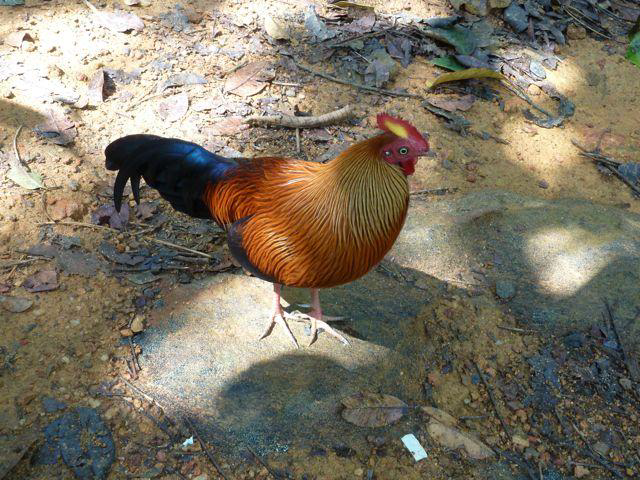
Sri Lankan Junglefowl
Days 3-4
Nuwara Eliya and Horton Plains.
High altitude tea country – stunning landscape with tea plantations and waterfalls throughout. Cold at night.
We stayed at BINOTA RESIDENCY, a large villa just out of town. Very pleasant, and very helpful staff with good Sri Lankan food. http://www.binota.net/
Horton Plains is a remote, high plateau (2,000m) of grassland, cloud forest and mountain streams. We arrived at the National Park at 5.30am, just in time to see the Sri Lankan Whistling Thrush at the gate. A small pond and waterway about 1km in from the entrance is perfect as the first sun comes through on the trees – highlights included Sri Lanka Dull Blue Flycatcher, Scimitar Babbler, Yellow-eared Bulbul, Grey-headed Canary-Flycatcher, Great Tit , Velvet-fronted Nuthatch, Hill Swallow, and, in the forest, a lovely pair of Sri Lanka Woodpigeon. The grass plains were good for reed-warblers, bushchats, shrikes and the
like.
The 9km walk to World’s End is not very steep and very worthwhile with stunning views. Take plenty of water because the grasslands are exposed and it can be hot.
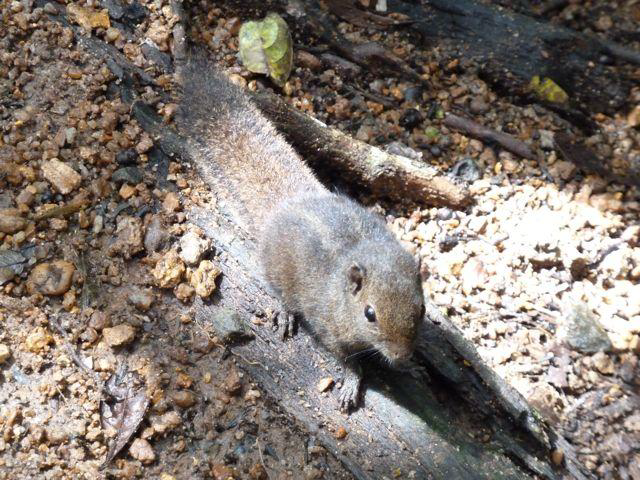
Layard’s Squirrel
Hakagala Gardens is 10km south of Nuwara Eliya – a Botanic gardens and adjacent forest high in the hills. It is excellent for the highland race of the Purple-faced Leaf Monkey, Lesser Hill Mynah, Bar-winged Flycatcher-Shrike , the always beautiful Asian Paradise-Flycatcher and both White-Eyes , including the endemic Ceylon White-Eye.

Purple-faced Leaf Monkey
Days 5-7
Sinharaja Rainforest (World Heritage site)
– a large area of rainforest 20km south of Ratnapura, and well known for mixed feeding flocks plus Sri Lankan endemics, as well as beautiful tropical rainforest with many endemic plant species.
We stayed at the famous MARTINS SIMPLE LODGE for 3 nights, just outside the park. This is the place for birdwatchers. It is a fairly rough and exciting jeep ride (in a torrential downpour for us) to get to, and it is basic, but so worthwhile. Martin’s daughters looked after us beautifully with excellent local Sri Lankan food. Martin is building another lodge in the local village 4Klm below which will be bigger and more luxurious. Highly recommended. Martin’s contact number: 0455681864
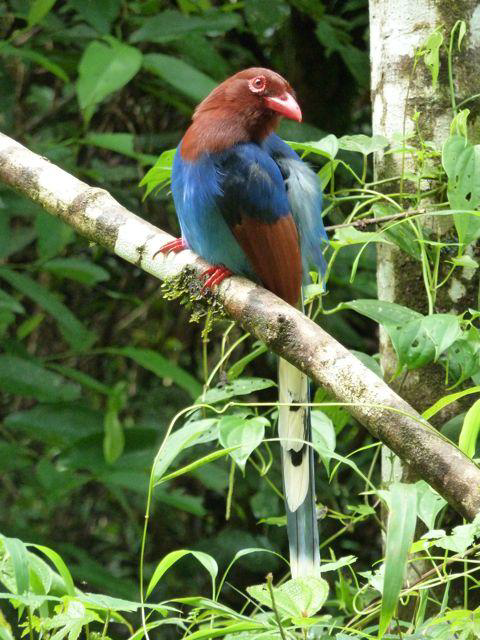
Ceylon Blue Magpie
Great views of Ceylon Blue Magpie and Ceylon Junglefowl throughout the forest walks, and at Mr Martins.
One of the highlights of Sinharaja is the mixed feeding flocks which include babblers, Malabar Trogon, Black-naped Monarch, Sri Lanka Crested Drongo, Black-capped Bulbul, Red-faced Malkoha, Yellow-browed Bulbul and others. Other new endemics for us included Legge’s Flowerpecker, Ashy-headed Laughing Thrush and Orange-billed Babbler.
The National Park guides worked very hard to find us some of the specialties, including Sri Lanka Frogmouth and Serendib Scops Owl. We had a lot of rain while there, so condi tions were slippery and leeches abound, but these are great birds to see and worth scrambling uphill through the scrub to find. We used, and would thoroughly recommend, hiking poles no matter how fit you may think you are.
The Park’s system of insisting on taking a local guide is very good – they are hard working and knowledgeable. A few are particularly interested in birds, and are well worth seeking out. There is good information at the Parks office about the rainforest, wildlife etc
Our organizer and guide, Jith Caldera, joined us for this part of the trip and proved to be knowledgeable and very familiar with the life of Sinharaja.
Advice - Buy or borrow leech socks, and wear them tightly done up – they make life much, much more pleasant.
Days 8-10
We stayed at Tissamahara for 3 nights for convenient access to Yala National Park and
Bundala National Park.
Accommodation was at HIBISCUS GARDEN HOTEL, a very modern hotel with large rooms, a pool and all other facilities. Happy to do early coffee and packed breakfasts for early departures to the parks. Very pleasant. www.hibiscus-garden.com
Much of this country had major damage in the 2004 Tsunami, so many hotels are new and modern.
Yala National Park
A very large reserve with rivers, lagoons, salt pans, rocky outcrops, shoreline and forest in south east, 40km from Hambantota.
Major damage and loss of life occurred in Yala during the Tsunami, but the vegetation seems to have recovered well. Yala is split into 4 blocks, of which only one is open at a time
to tourists. A great conservation move!
Our full-day Safari at Yala NP was a highlight of the trip. 85 bird species plus 12 different mammals including the mighty Leopard.

Leopard
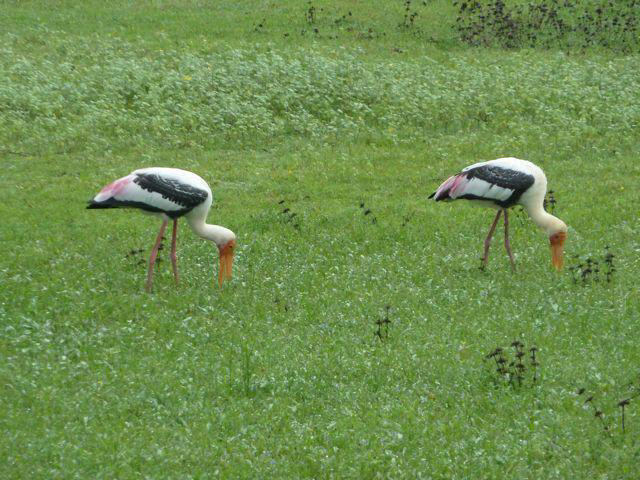
Painted Stork
All tours of Yala involve a Jeep Safari of varying standards and costs, and a park guide accompanies all visitors. We were fortunate to have a keen bird guide, plus a jeep operator who was keen to work with birdwatchers (some aren’t). An independent owner, Gayan from Gayan Safari, was an excellent spotter who understood our needs and was keen to help. We’d recommend finding him if going to Yala and/or Bundala. Ph 077 1942379
Email: gayanyalasafari@gmail.com
Highlights of our day in Yala included catching up with some of the waterbirds – Wooly- necked Stork, Painted Stork, Eurasian Spoonbill, Spot-billed Pelican, Pheasant-tailed Jacana and others, plus the Yellow-wattled Lapwing, a range of migratory waders, the Brown Fish Owl, good looks at the Sri Lanka Swallow, Brahminy Starling, Rosy Starling, Malabar Pied Hornbill, Orange-breasted Green-Pigeon and a variety of kingfishers, bee- eaters, sunbirds and munias. The variety of habitats proved very rewarding.
It was an excellent day, and we would consider a second full or half-day, if time permitted. Mammals included Leopard, Asian Elephant, Golden Jackal, Water Buffalo, Ruddy
Mongoose, Spotted Deer, Wild Boar and Grey Langur.
The last full day of the tour was spent at Bundula National Park. Scrub Jungle with lagoons, saltpans and shore line on the south coast, 10km east of Hambantota.
Again, with Jith guiding and Gayan driving, we made an early start to Bundala NP, a
Ramsar-listed Wetland with an excellent interpretive centre and facilities.
Well known for winter migratory waders, we picked up many including Redshank, Wood
Sandpiper, Little Stint, Ruddy Turnstone, Small Pratincole and Black-tailed Godwit.
Other new species for us, both within the park and at surrounding wetland areas included Grey-headed Fish-Eagle, Watercock, Little Grebe, Black Bittern, Yellow Bittern, Garganey, Pintail Snipe, Little Green Heron, Eurasian and Greater Thick-knee.
Day 11
A coastal drive south to our beachside stop near Matara, picking up some terns along the way. Saying goodbye to Jith and his faithful driver Silva was a little difficult, although Jith
was still making plans and helping us with the rest of our holiday, at no extra cost.
A great tour, with 200 bird species (including 28 or the 33 endemics) seen by the end, plus
17 mammals and a similar numbers of identified reptiles. We were extremely happy with the outcome and would recommend the tour highly.
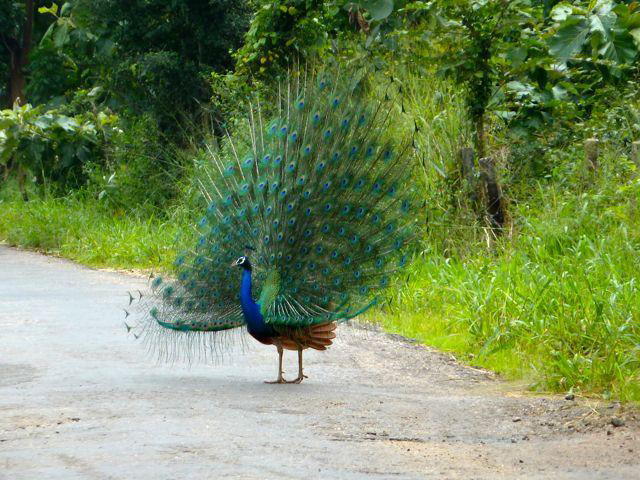
Indian Peafowl
Following from the tour, Jith organized Nandana Hewa Gamage, an accomplished bird guide, to accompany us for a further 5 days, taking in the Cultural Triangle area of the north-east Sri Lanka.
Being drier country, we picked up the endemic Ceylon Woodshrike, new kingfishers –
Oriental Dwarf Kingfisher, Stork-billed Kingfisher, the Black-headed Cuckooshrike, Lesser Adjutant and several of the smaller birds we’d missed previously. It was also a good chance to reinforce some of the birds we may have picked up quickly previously.
We would highly recommend Nandana as a bird and cultural tourism guide.
We stayed at MPS VILLAGE near Dambulla. www.mpsdambulla.com
Great grounds with a lake and varied neighbouring walks – 75 species over the morning walks. Very impressive. Good rates, 8 double rooms available plus a bungalow. An excellent swimming pool and helpful staff catering to birders needs.
Sri Lanka Bird List
Trish and Andrew Forsyth - Red Mill House in Daintree - December 2011
Little Grebe
Spot-billed Pelican
Little Cormorant
Indian Shag
Great Cormorant
Oriental Darter
Little Egret
Eastern Great Egret
Intermediate Egret
Cattle Egret
Grey Heron
Purple Heron
Indian Pond Heron
Black-crowned Night-Heron
Striated Heron
Yellow Bittern
Black Bittern
Painted Stork
Asian Openbill
Wooly necked-Stork
Lesser Adjutant
Glossy Ibis
Black-headed Ibis
Eurasian Spoonbill
Lesser Whistling Duck
Cotton Pygmy-Goose
Garganey
Jerdon’s Baza
Oriental Honey-Buzzard
Black-winged Kite
Brahminy Kite
White-bellied Sea-Eagle
Grey-headed Fish-Eagle
Crested Serpent-Eagle
Shikra
Black Eagle
Changeable Hawk-Eagle
Mountain Hawk-Eagle
Common Kestrel
Ceylon Junglefowl E
Indian Peafowl
Barred Buttonquail
White-breasted Waterhen
Watercock
Purple Swamphen
Common Moorhen
Pheasant-tailed Jacana
Pacific Golden Plover
Grey Plover
Kentish Plover
Lesser Sand Plover
Greater Sand Plover
Yellow-wattled Lapwing
Red-wattled Lapwing
Pintail Snipe
Black-tailed Godwit
Common Redshank
Common Greenshank
Marsh Sandpiper
Green Sandpiper
Wood Sandpiper
Common Sandpiper
Little Stint
Black-winged Stilt
Indian Stone-Curlew
Great Thick-knee
Small Pratincole
Brown-headed Gull
Gull-billed Tern
Caspian Tern
Great-crested Tern
Little Tern
Whiskered Tern
Rock Pigeon
Sri Lanka Woodpigeon E
Spotted Dove
Orange-breasted Green-Pigeon E
Sri Lanka Green-Pigeon E
Green Imperial-Pigeon
Ceylon Hanging-Parrot E
Alexandrine Parakeet
Rose-ringed Parakeet
Plum-headed Parakeet
Layard’s Parakeet E
Greater Coucal
Red-faced Malkoha
Blue-faced Malkoha
Pied Cuckoo
Grey-bellied Cuckoo
Common Barn Owl
Serendib Scops Owl E
Collared Scops Owl
Brown Wood-Owl
Chestnut-backed Owlet
Sri Lanka Frogmouth E
Indian Little Nightjar
Brown-throated Needletail
Asian Palm-Swift
Little Swift
Crested Treeswift
Malabar Trogon
Common Kingfisher
Oriental Dwarf Kingfisher
Stork-billed Kingfisher
White-throated Kingfisher
Lesser Pied Kingfisher
Little Green Bea-eater
Blue-tailed Bee-eater
Chestnut-headed Bee-eater
Indian Roller
Sri Lanka Grey Hornbill E
Malabar Pied Hornbill
Brown-headed Barbet
Yellow -fronted Barbet E
Crimson-fronted Small Barbet E
Ceylon Pygmy Woodpecker E
Lesser Yellownape
Black-rumped Flameback
Greater Flameback E
Indian Pitta
Oriental Skylark
Barn Swallow
Hill Swallow
Red-rumped Swallow
Sri Lanka Swallow E
Forest Wagtail
Grey Wagtail
Western Yellow Wagtail
Paddyfield Pipit
Black-headed Cuckoo-Shrike
Small Minivet
Orange Minvet
Bar-winged Flycaycher-Shrike
Sri Lanka Woodshrike E
Asaian Paradise-Flycatcher
Black-naped Blue Monarch
White-browed Fantail
Black-capped Bulbul E
Red-vented Bulbul
Yellow-eared Bulbul E
White-browed Bulbul
Yellow-browed Bulbul
Black Bulbul
Common Iora
Gold-fronted Leafbird
Jerdon’s Leafbird
Brown Shrike
Philippine Shrike
Spot-winged Ground-Thrush E
Sri Lanka Whistling Thrush E
Asian Brown Flycatcher
Dull-blue Flycatcher E
Tickell’s Blue Flycatche
Grey-headed Canary-Flycatcher
Oriental Magpie Robin
Indian Black Robin
Pied Bushchat
Ashy-headed Laughingthrush E
Brown-capped Babbler E
Sri-Lanka Scimitar-Babbler E
Tawny-bellied Babbler
Orange-billed Babbler E
Yellow-billed Babbler
Zitting Cisticola
Grey-breasted Prinia
Ashy Prinia
Plain Prinia
Common Tailorbird
Blythe’s Reed-Warbler
Indian Reed-Warbler
Greenish Warbler
Great Tit
Velvet-fronted Nuthatch
Thick-billed Flowerpecker
Legge’s Flowerpecker E
Pale-billed Sunbird
Purple Sunbird
Purple-rumped Sunbird
Long-billed Sunbird
Ceylon White-eye E
Oriental White-eye
White-rumped Munia
Scaly-breasted Munia
Tri-coloured Munia
House Sparrow
Baya Weaver
Rosy Starling
Brahminy Starling
Common Mynah
Lesser Hill Mynah
Ceylon Hill Mynah E
Black-hooded Oriole
Black Drongo
White-bellied Drongo
Ceylon Crested Drongo E
Ceylon Blue Magpie E
House Crow
Indian Jungle Crow
| MAMMALS LIST | REPTILES LIST |
| Palm Squirrel | Rhino-horned Lizard |
| Giant Squirrel | Common Garden Lizard |
| Layards Squirrel | Kangaroo Lizard |
| Purple-faced Leaf Monkey (Bear Monkey) |
Green Forest Lizard |
| Red-faced Macaque (Toque Monkey) | Hump-nosed Lizard |
| Grey Langur (Hanuman) | Black-cheeked Lizard |
| Black-naped Hare | Rock Skink |
| Samba Deer | Spotted Supple Skink |
| Spotted Deer | Pock Python |
| Mouse Deer | Rate Snake |
| Wild Boar | Spectacled Cobra |
| Golden Jackal | Green Viper |
| Ruddy Mongoose | Keel-backed Water snake |
| Grey Mongoose | Land Monitor |
| Water Buffalo | Water Monitor |
| Leopard | Mugger Crocodile |
| Asian Elephant | Estuarine Crocodile |
| Flying Fox |
Tour Categories:
Country:
- Log in to post comments


















